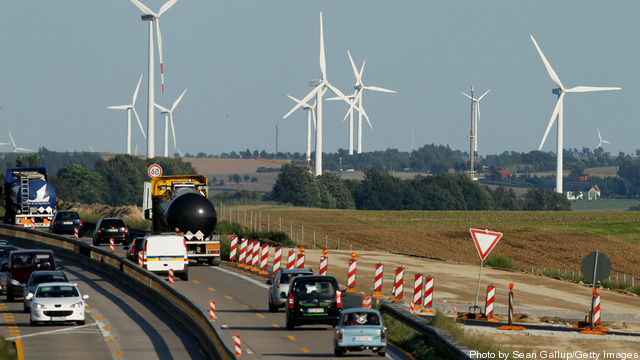Both presidential candidates are trumpeting energy independence in this year’s election. But the path they describe to get there is not the same, especially when it comes to fossil fuels.
Their website slogans encapsulate the differences. President Barack Obama’s is “Energy and the Environment;” Republican nominee Mitt Romney “Energy: Pro-Jobs, Pro-Market, Pro-American.”
Who could argue with either?
“The United States has always relied on a diversity of energy sources and no serious analyst believes that will change any time soon. But that does not mean that all energy policies are good. The devil is in the details,” said Frank Laird, associate professor at the Josef Korbel School of International Studies at the University of Denver.
Here are some of the details on where the Presidential candidates stand.
Romney’s plan focuses heavily on oil and gas and calls for fast-tracked permits and reduced regulation to make it easier to develop energy projects. He would relinquish to the states control over development on federal lands. He proposes a five-year leasing program to “aggressively” pursue offshore energy development, beginning in Virginia and the Carolinas.
While Romney also addresses renewable energy, calling for easier siting rules and basic research funding, his focus is clearly on fossil fuels.
Arno Harris, CEO of Recurrent Energy and board chairman of the Solar Energy Industries Association, charges that Romney is pursuing an “archaic” policy of slash and burn. “Slash renewables and focus on things you can burn: coal and gas and oil.”
Meanwhile, Obama emphasizes independence from foreign oil and pursuit of clean energy and efficiency. Obama’s critics paint him as obstructing fossil fuels.
“The Obama approach is to put obstacles in the way of American energy self-sufficiency rather than support the oil industry’s efforts to make the US one of the top oil and natural gas producers in the world,” said Chris Faulkner, CEO of Dallas-based Breitling Oil and Gas.
But Obama’s campaign points to the dramatic expansion of oil and gas supply on his watch. U.S. crude oil production reached its highest level last year since 2003; the nation became the world largest producer of natural gas; oil imports dropped to their lowest since 1995, as a share of consumption, according to his campaign website.
Does Obama deserve credit – or the market?
“He certainly deserves credit for not having it run off the rails. There are a lot of things that a politician can do to screw these things up,” said Andrew Holland, senior fellow for energy and climate at the American Security Project.
Both parties would like to lay claim to the US energy supply boom – but probably cannot, according to Greg Croft, an earth and environmental sciences lecturer at Saint Mary’s College of California.
“There isn’t a lot of evidence for federal policy having anything to do with the increases in gas and oil production. The shale gas boom began with the Barnett Shale. This was developed by private operators on private land in Texas and most regulation of oil and gas drilling takes place at a state level,” he said.
Obama’s position on coal has stirred even more rancor, as Romney heavily courts miners and paints Obama as coal’s enemy. Over the next five years, the US is expected to lose 8.5 percent of its coal-fired generation to retirement, a quadrupling over the previous five years, according to the US Energy Information Administration. Both the Romney camp and the industry hold Obama’s environmental policy responsible – the United Mine Workers of America, which endorsed Obama in his 2008 bid, has since called him “tone deaf” to the needs of coal miners.
But just as Obama may be getting too much credit for the oil and gas boom, he may be getting too much blame for coal’s bust, particularly given the drop in natural gas prices, say industry observers.
“It’s the old Herbert Hoover line – the President gets blamed for the rain,” Holland said. “This reputation he has of an anti-coal guy is a little unfair. Coal has been a victim of a significant free market turn away from it. It is no longer cost effective for a utility to build a new coal plant.”
Another clear distinction between the candidates comes out in their energy tax proposals. Obama wants to eliminate $40 billion in tax breaks for fossil fuels, while Romney opposes the extension of wind power’s federal tax production tax credit.
Less clear is the difference in their positions on TransCanada’s Keystone XL pipeline, proposed to move Canadian synthetic crude oil to refineries in the US. Romney says he supports the project; Obama refused to sign a Presidential Permit for the line in January. But he said in a statement released by the White House that his decision was “not a judgment on the merits of the pipeline.” Instead, he charged that Congressional Republicans rushed the process, so the State Department didn’t have the time to fully review the application. TransCanada has since revised and re-filed the application and expects a decision in first quarter of 2013.
So will the election outcome mean more, less or the same when it comes to fossil fuels? Romney has positioned himself as the candidate for the future of fossil fuels; Obama as the leader presiding over today’s oil and gas boom. Market forces are the wildcard.
This is the second article in a four-part Breaking Energy series by Elisa Wood on energy and the presidential election.









